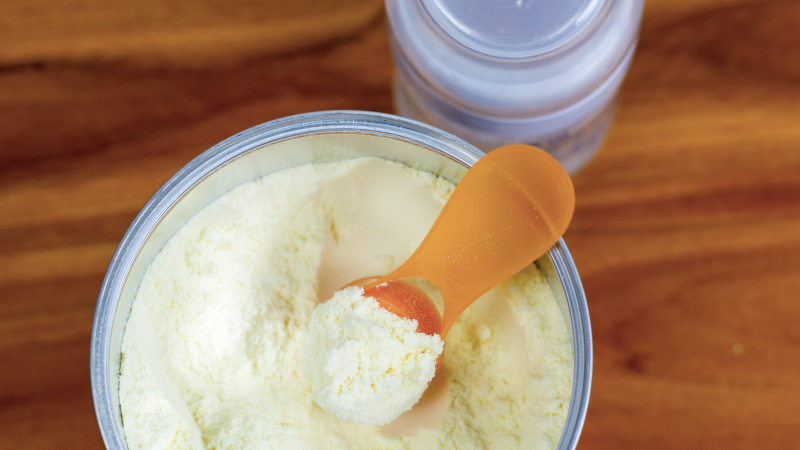Many infants in the U.S. rely on infant formula for some or all of their nutrition. Ensuring that the youngest and most vulnerable individuals have access to safe and nutritionally adequate formula products is a top priority for the Food and Drug Administration (FDA). The agency oversees manufacturers of infant formulas and helps ensure that these products are safe and support healthy growth in infants who consume them. The agency also works with multiple partners in public health to ensure that parents and caregivers have the latest information regarding safe preparation of infant formula and to answer questions regarding the safety and nutritional quality of formula. In addition, the FDA is working on a number of fronts to support the availability and resiliency of the infant formula market.
On this page:
How does the FDA oversee the safety and nutritional quality of infant formula?
Infant formulas are intended for children up to 12 months of age. The FDA regulatory requirements address the safety, nutritional adequacy, packaging, and labeling of these products. The FDA does not approve infant formulas; however, infant formula manufacturers must notify the agency before marketing a new formula. FDA’s highly trained staff review these notifications to make sure new formulas meet federal nutrition, labeling, and other requirements. If a product does not meet applicable requirements, the formula may be deemed adulterated, misbranded, or both, and the FDA has the authority to take enforcement action if it is marketed. Federal law permits the FDA to require a mandatory recall if the agency determines that an adulterated or misbranded infant formula presents a risk to human health.
Among the requirements for infant formulas, the FDA specifies 30 nutrients that must be included in infant formulas. There are minimum amounts for all 30 nutrients and maximum amounts for 10 nutrients. In addition, any ingredient used in infant formula must be safe and suitable for such use. Controls are required by law to prevent contamination and other problems from happening. For example, manufacturers must establish a system of controls designed to ensure that infant formula does not become adulterated due to the presence of microorganisms in the formula or in the processing environment. Further, FDA regulations set forth certain testing requirements of finished product for Salmonella and Cronobacter. The FDA also makes sure that the water the companies use to manufacture formulas meets safety standards set by the U.S. Environmental Protection Agency.
The FDA has specific requirements for labeling infant formulas. Information that is most helpful for caregivers of infants includes: directions for preparation and use, a pictogram showing the major steps for preparing infant formula, use by date, and instructions indicating whether water should be added.
The FDA inspects facilities that manufacture infant formulas annually and carefully trains its investigators to ensure that every infant formula inspection is robust, thorough, and focused on the most critical aspects of the infant formula manufacturing process. The FDA has also taken, and continues to take, multiple steps to improve the resiliency of the infant formula supply, including the temporary exercise of enforcement discretion, which are described in the agency’s Immediate National Strategy to Increase the Resiliency of the U.S. Infant Formula Market. Some of this work includes working with manufacturers, who are now required to have risk redundancy plans, to help ensure a stable and consistent supply of infant formula.
In 2022, safety concerns with powdered infant formula led to a voluntary recall of specific lots of powdered infant formula manufactured at an Abbott Nutrition facility in Sturgis, Michigan. Since then, the agency has taken steps to enhance the safety of powdered infant formula through the development of a Cronobacter prevention strategy, enhanced inspection activities, increased engagement with the infant formula industry, and by pursuing regulatory action when appropriate. Most recently, in March 2023, the FDA issued a letter to the powdered infant formula industry to share current safety information and call on the industry to take prompt action to improve processes and programs for the protection of infants.
Illegally imported formulas may be available online or from third-party distributors. These formulas are sometimes promoted as better for babies, but there is no scientific evidence that these infant formulas are better for babies than commercial infant formulas lawfully sold in the United States. All infant formulas legally sold in the United States—whether made in the United States or imported from other countries—must meet the same nutritional and safety requirements.
Advice for Parents and Other Caregivers
While breastfeeding is strongly encouraged by the American Academy of Pediatrics, most infants in the U.S. rely on infant formula for some or all of their nutrition. The agency is working with manufacturers, who are now required to have risk redundancy plans, to ensure a stable and consistent supply of infant formula in the U.S., but we recognize that at times it may be difficult to find the formula you need. The Department of Health and Human Services has made resources available explaining what to do if you can’t find your formula.
Products on the Market
Check with your infant’s health care provider to determine which infant formula to choose.
Routine formulas are formulas intended for healthy, full-term infants. These formulas may contain cow’s milk, goat’s milk, or soy. These formulas can also be modified to meet specific needs of full-term infants who are not premature. For example:
- Partially hydrolyzed infant formula contains cow’s milk proteins that have already been partially hydrolyzed, or broken down, and may be easier to digest.
- Spit-up formulas are thickened with the aim of reducing acid reflux.
- Lactose-free formula contains no lactose (a sugar found in milk) for infants that have difficulty digesting it.
Specialty formulas are intended for use by an infant who has an inborn error of metabolism, low birth weight, or who otherwise has an unusual medical or dietary problem. Some of these formulas are not available in retail settings and may be prescribed by a physician. Examples include:
- Hypoallergenic formulas with extensively hydrolyzed protein that are effective for the treatment of milk protein allergy. In these formulas, the protein has been broken down so that it can be more easily digested.
- Formulas to treat a specific medical condition such as an inborn error of metabolism. For example, a formula for individuals with Phenylketonuria (PKU) does not contain the amino acid phenylalanine.
- Infant formulas for premature infants, which may include more nutrients and calories to meet their increased nutritional needs.
- Amino acid-based formulas, which contain amino acids as their protein source. These formulas can be used for infants with severe milk allergies, short-gut syndrome, or other medical conditions.
Due to their composition and intended use to address specific conditions, specialty formulas may be exempt from certain nutrition labeling and nutrient specifications.
Infant formulas come in three forms:
- Powder — Must be mixed with water before feeding.
- Liquid concentrate — Must be mixed with an equal amount of water before feeding.
- Ready-to-feed — Requires no mixing.
The infant formulas currently available in the U.S. must be labeled as either “Infant Formula with Iron” or “Additional Iron May Be Necessary.” The American Academy of Pediatrics recommends that formula-fed infants receive an “Infant Formula with Iron” as a way of preventing iron-deficiency anemia.
Safe Preparation and Feeding of Formulas
Cronobacter is a germ (bacteria) that is naturally found in the environment and can contaminate powdered infant formula and cause illness. While infections are rare, they can be life-threatening in infants, particularly those who are younger than two months old, premature, immunocompromised, or of low birthweight. It is important for caregivers to know the risks and how to minimize them through safe handling, storage, and sanitation.
The safe preparation and feeding of formulas is important for your baby’s health. Prepare infant formula according to instructions on the infant formula label. The label also must include information on storing and throwing away prepared formula. Also, use safe handling techniques. For example, bottles, rings, caps, and nipples need to be cleaned and sanitized. Infant formula packages also must include the “Use By” Date, which is the date up to which the manufacturer guarantees the nutrient content and the quality of the formula.
Don’t Feed Infants Homemade Infant Formula
The FDA advises parents and caregivers not to make or feed homemade infant formula to infants. Homemade infant formula recipes have not been evaluated by the FDA and may lack nutrients vital to an infant’s growth. The agency has received reports of hospitalized babies who have been fed homemade infant formula and then suffered from hypocalcemia (low calcium). Other potential problems with homemade formulas include contamination. These problems are serious, and the consequences may range from severe nutritional imbalances to foodborne illnesses, both of which can be life-threatening.
Toddler Nutritive Drinks
Toddler nutritive drinks, often marketed as “toddler formulas,” are not necessary to meet the nutritional needs of older babies. Babies younger than age 12 months should be fed infant formulas specifically designed to meet their nutritional needs. They should not be fed toddler drinks or formulas labeled for toddlers. Additionally, toddler nutritive drinks do not undergo premarket review by FDA.
Identifying and Reporting a Problem
If you have concerns about infant formula, contact your health care provider and FDA at 1-888-INFO-FDA (1-888-463-6332), or you can file a report online at MedWatch.
Information for Infant Formula Manufacturers
Manufacturers of infant formula must comply with applicable Federal Food, Drug, and Cosmetic Act requirements and those contained in FDA’s implementing regulations. More information on these requirements can be found on the FDA’s Infant Formula Guidance Documents & Regulatory Information webpage. In addition, the FDA has held a series of webinars, for which recordings are now available, that discuss infant formula requirements.
A manufacturer who intends to market a new infant formula in the U.S. must register with, notify, and submit a written verification of regulatory compliance to the FDA. The FDA encourages infant formula manufacturers to contact [email protected] with questions about infant formula. New infant formula submissions must be sent to the FDA at least 90 days before the introduction or delivery for introduction into interstate commerce of a new infant formula.
In 2022, safety concerns with powdered infant formula led to a voluntary recall of specific lots of powdered infant formula products manufactured at an Abbott Nutrition facility in Sturgis, Michigan. Since then, the agency has taken steps to enhance the safety of powdered infant formula through the development of a prevention strategy, enhanced inspection activities, increased engagement with the infant formula industry, and by pursuing regulatory action when appropriate. Most recently, in March 2023, the FDA issued a letter to the powdered infant formula industry to share current safety information and call on the industry to take prompt action to improve processes and programs for the protection of infants.
In response to the infant formula supply disruption that followed the voluntary recall, the FDA has also taken multiple steps to improve the resiliency of the infant formula supply, including by providing manufacturers some flexibility through the exercise of enforcement discretion. You can learn more about this work through the agency’s Infant Formula Transition Plan for Exercise of Enforcement Discretion.
The Food and Drug Omnibus Reform Act of 2022 amended the Federal Food, Drug, and Cosmetic Act to add new requirements for manufacturers of critical foods, such as infant formula, including requirements:
- to develop, maintain and implement risk redundancy plans to identify and manage risks to the supply of the critical food to help prevent future supply chain disruptions.
- to notify FDA of meaningful disruptions in the production of formula that could lead to shortages.
Latest News
| Date | Release |
|---|---|
| May 19, 2023 | FDA Announces National Academies Study of Supply, Market Competition, and Regulation of Infant Formula in the U.S. |
| April 26, 2023 | FDA to Host Two Webinars on Infant Formula Food Ingredients and Packaging Requirements |
| March 28, 2023 | FDA Outlines Immediate National Strategy to Further Increase the Resiliency of the U.S. Infant Formula Market |
| February 28, 2023 | FDA Provides Update on Proposed Human Foods Program and Office of Regulatory Affairs Restructuring |
| February 23, 2023 | What FDA’s Foods Program Achieved in 2022 to Protect Consumers and the Food Supply |
| January 31, 2023 | FDA Proposes Redesign of Human Foods Program to Enhance Coordinated Prevention and Response Activities |
| January 9, 2023 | FDA Issues Letters of Acknowledgement for Infant Formula Transition Plan |
| November 17, 2022 | Webinar Series to Discuss the Infant Formula Transition Plan for Exercise of Enforcement Discretion |
| November 16, 2022 | Focusing on Prevention to Safeguard Infant Formula |





